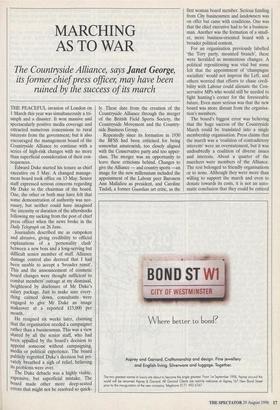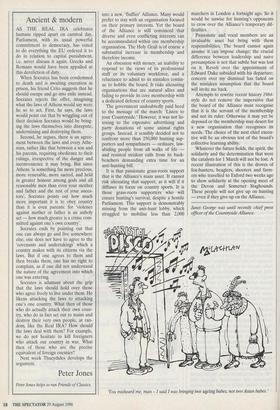MARCHING AS TO WAR
The Countryside Alliance, says Janet George,
its former chief press officer, may have been ruined by the success of its march
THE PEACEFUL invasion of London on 1 March this year was simultaneously a tri- umph and a disaster. It won massive and spectacularly positive media coverage and extracted numerous concessions to rural interests from the government; but it also encouraged the management board of the Countryside Alliance to continue with a series of high-risk changes with no more than superficial consideration of their con- sequences.
Edward Duke started his tenure as chief executive on 5 May. A changed manage- ment board took office on 13 May. Senior staff expressed serious concerns regarding Mr Duke to the chairman of the board. One, the other or both may have felt that some demonstration of authority was nec- essary, but neither could have imagined the intensity or duration of the aftershocks following my sacking from the post of chief press officer when the news broke in the Daily Telegraph on 26 June.
Journalists described me as outspoken and abrasive, giving credibility to official explanations of a 'personality clash' between a new boss and a long-serving but difficult senior member of staff. Alliance damage control also decreed that I had been unable to accept a 'broader remit'. This and the announcement of cosmetic board changes were thought sufficient to combat members' outrage at my dismissal, heightened by disclosure of Mr Duke's salary package. Just to make sure every- thing calmed down, consultants were engaged to give Mr Duke an image makeover at a reported £15,000 per month.
He resigned six weeks later, claiming that the organisation needed a campaigner rather than a businessman. This was a view shared by all the senior staff, who had been appalled by the board's decision to appoint someone without campaigning, media or political experience. The board publicly regretted Duke's decision but pri- vately breathed a sigh of relief, believing its problems were over.
The Duke debacle was a highly visible, expensive, but superficial mistake. The board made other more deep-seated errors that might not be resolved so quick- ly. These date from the creation of the Countryside Alliance through the merger of the British Field Sports Society, the Countryside Movement and the Country- side Business Group.
Repeatedly since its formation in 1930 the BFSS had been criticised for being somewhat amateurish, too closely aligned with the Conservative party and too upper- class. The merger was an opportunity to leave these criticisms behind. Changes to give the Alliance — and country sports —an image for the new millennium included the appointment of the Labour peer Baroness Ann Mallalieu as president, and Caroline Tisdall, a former Guardian art critic, as the first woman board member. Serious funding from City businessmen and landowners was on offer but came with conditions. One was that the chief executive had to be a business- man. Another was the formation of a small- er, more business-oriented board with a broader political content.
For an organisation previously labelled `the Tory party, mounted branch', these were heralded as momentous changes. A political repositioning was vital but some felt that the appointment of 'champagne socialists' would not impress the Left, and others worried that efforts to chase credi- bility with Labour could alienate the Con- servative MPs who would still be needed to fight hunting's corner for the foreseeable future. Even more serious was that the new board was more distant from the organisa- tion's members.
The board's biggest error was believing that the huge success of the Countryside March could be translated into a single membership organisation. Press claims that the march was a 'coalition of contradictory interests' were an overstatement, but it was undoubtedly a coalition of diverse issues and interests. About a quarter of the marchers were members of the Alliance. The rest belonged to friendly organisations or to none. Although they were more than willing to support the march and even to donate towards its costs, it is not an auto- matic conclusion that they could be enticed into a new, 'fluffier' Alliance. Many would prefer to stay with an organisation focused on their primary interests. Yet the board of the Alliance is still convinced that diverse and even conflicting interests can be accommodated within one membership organisation. The Holy Grail is of course a substantial increase in membership and therefore income.
An obsession with money, an inability to respond to the views of its professional staff or its voluntary workforce, and a reluctance to admit to its mistakes contin- ue to hobble the board. It risks alienating organisations that are natural allies and failing to provide its core membership with a dedicated defence of country sports.
The government undoubtedly paid heed to the message of the march: 'Listen to your Countryside.' However, it was not lis- tening to the expensive advertising and party donations of some animal rights groups. Instead, it sensibly decided not to confront more than 250,000 hunting sup- porters and sympathisers — ordinary, law- abiding people from all walks of life and resisted strident calls from its back- benchers demanding extra time for an anti-hunting bill.
It is that passionate grass-roots support that is the Alliance's main asset. It cannot risk alienating that support, as it will if it diffuses its focus on country sports. It is those grass-roots supporters who will ensure hunting's survival, despite a hostile Parliament. This support is demonstrably missing from the anti-hunt lobby, which struggled to mobilise less than 2,000 marchers in London a fortnight ago. So it would be unwise for hunting's opponents to crow over the Alliance's temporary dif- ficulties.
Passionate and vocal members are an invaluable asset but bring with them responsibilities. The board cannot again assume it can impose change; the crucial difference between leadership and naive presumption is not that subtle but was lost on it. Revolt over the appointment of Edward Duke subsided with his departure; concern over my dismissal has faded on the mistaken assumption that the board will invite me back.
Attempts to rewrite recent history 1984- style do not remove the imperative that the board of the Alliance must recognise that it is the servant of the membership and not its ruler. Otherwise it may yet be deposed or the membership may desert for a new organisation that recognises its needs. The choice of the next chief execu- tive will be an obvious test of the board's collective learning ability.
Whatever the future holds, the spirit, the solidarity and the determination that were the catalysts for 1 March will not be lost. A recent illustration of this is the droves of fox-hunters, beaglers, shooters and farm- ers who travelled to Exford two weeks ago to show solidarity at the opening meet of the Devon and Somerset Staghounds. These people will not give up on hunting — even if they give up on the Alliance.
Janet George was until recently chief press officer of the Countryside Alliance.
`You misheard me, man -1 said 1 was bringing two ageing babes, not two Asian babes.'



























































 Previous page
Previous page